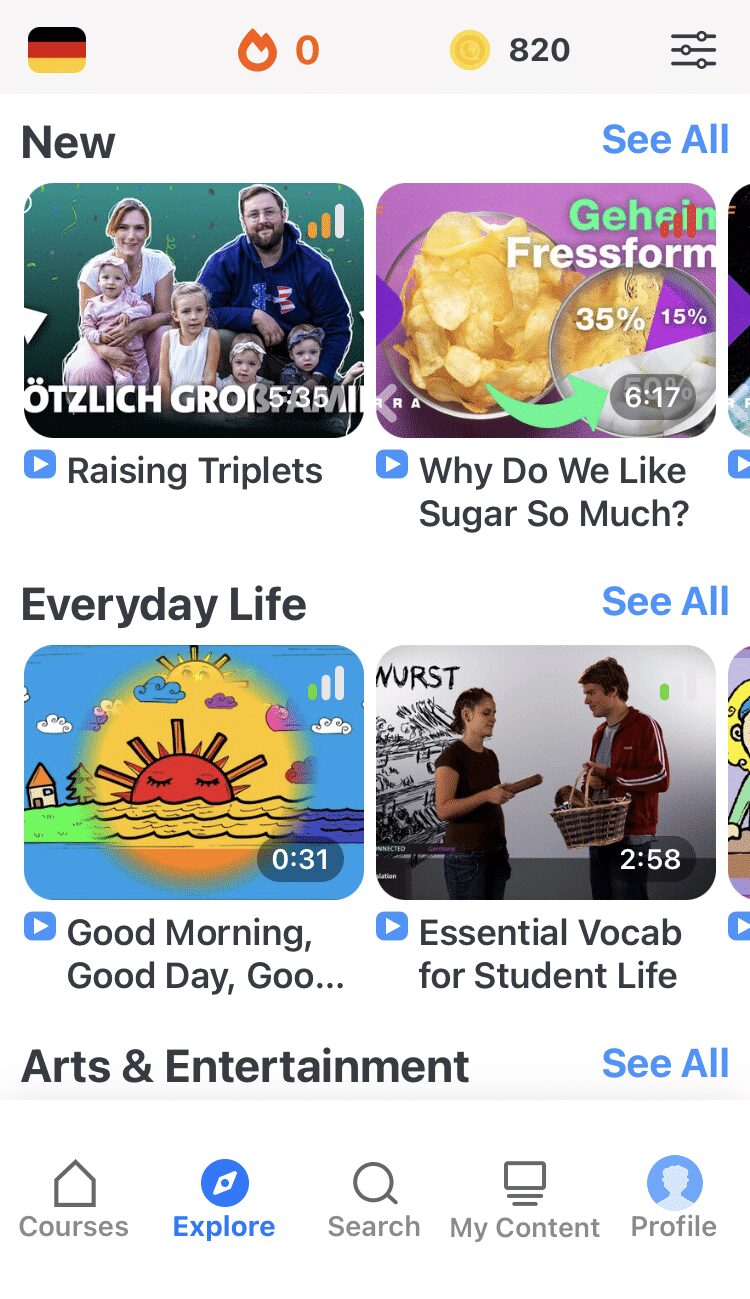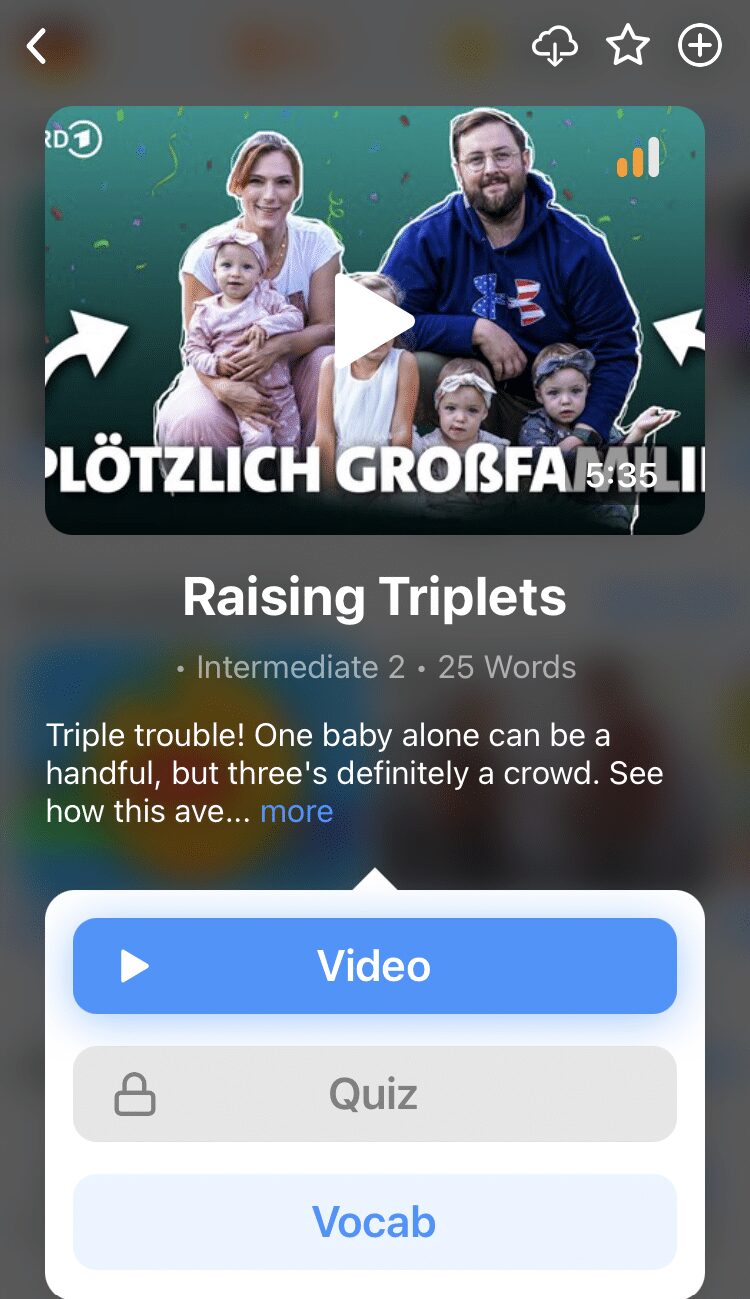Guide to the German Imperative

German imperative is one of those grammar forms that will come in handy when you least expect it. You never know when you might need to give instructions or tell someone to mind their own business.
We’ll help you with how to build German imperative sentences, know when to use them, and understand the exceptions.
Download: This blog post is available as a convenient and portable PDF that you can take anywhere. Click here to get a copy. (Download)
How to Build Your German Imperative Phrases
To get the whole picture, we’ll need to look at four forms. Fortunately, they all tend to follow relatively simple rules. Let’s take the verb geben (to give).
| Pronoun | Present Tense | Imperative |
|---|---|---|
| du
second person singular | Du gibst mir das Buch. | Gib mir das Buch! |
| ihr
second person plural (Informal) | Ihr gebt mir das Buch. | Gebt mir das Buch! |
| Sie
second person singular and plural (formal) | Sie geben mir das Buch. | Geben Sie mir das Buch! |
| wir
first person plural | Wir geben das Buch. | Geben wir das Buch! |
Second Person Singular (Informal) — du
For du (you), the imperative is usually formed by taking the stem of the verb in the present tense and dropping the “st.”
Du gibst mir das Buch. (You give me the book.)
Gib mir das Buch! (Give me the book!)
Second Person Plural (Informal) — ihr
When addressing a group of people informally, the imperative form stays the same as the present tense. You just drop the ihr (you).
Ihr gebt mir das Buch. (You (all) give me the book.)
Gebt mir das Buch! (Give me the book!)
Second Person Singular and Plural (Formal) — Sie
In the same way, when addressing an individual or group formally, once again you use the present tense form. However, the personal pronoun Sie (you) now comes after the verb.
Sie geben mir das Buch. (You give me the book.)
Geben Sie mir das Buch! (Give me the book!)
First Person Plural — wir
This one you’d use when addressing a group that includes yourself. It behaves exactly like the formal version of second person singular/plural, so wir (we) comes after the infinitive form of the verb.
Wir geben das Buch. (We give the book.)
Geben wir das Buch! (Let’s give the book!)
Note: You can also use the verb lassen (to let, or to leave) to give an imperative direction to a collective “we.”
In this case, it works just like the du form that we looked at already, coupled with the infinitive version of the particular action verb. Because the subject (we) in this case is accusative, wir becomes uns , giving us:
Lass uns lesen! (Let’s read!)
Lass uns gehen! (Let’s go!)
Exceptions in the German Imperative
Verbs Ending in -s, -z, -x or -ß
For these, only the -t is removed from the present tense form (not the whole -st), like this:
| Present Simple | Imperative |
|---|---|
| Du sitzt. | Sitz! |
Here you can see the translations:
Du sitzt. (You sit.)
Sitz! (Sit down!)
Special Cases: haben, sein and werden
These three commonly used verbs behave irregularly and deserve a closer look here, as follows:
| Verb | Present Simple | Imperative |
|---|---|---|
| haben (to have) | Du hast kein Angst. | Hab kein Angst! |
| sein (to be) | Du bist ruhig. | Sei ruhig! |
| werden (to become) | Du wirst böse. | Werde nicht böse! |
Here they are along with the translations:
haben (to have)
Du hast kein Angst. (You’re not afraid. Literally — you have no fear.)
Hab kein Angst! (Don’t be afraid! Literally — have no fear!)
sein (to be)
Du bist ruhig. (You are calm.)
Sei ruhig! (Calm down! Literally — be calm!)
werden (to become)
Du wirst böse. (You get angry.)
Werde nicht böse! (Don’t get angry!)
Public Notices or Requests
These tend to be given in the infinitive form instead of the imperative, for example:
Bitte nicht rauchen. (Please don’t smoke.)
An Extra -e
Not so much an exception as a variation, you might see an extra -e added to the end of the imperative form for du at times.
This used to be the way the form was written, and is still valid in written German, though these days no longer spoken.
When to Use the German Imperative
So when do you actually use it? There are all kinds of circumstances that call for a direction, command or instruction. Here are a few examples:
Offering Encouragement
What should you say if you want to urge a colleague or friend to do something? You could say:
Du solltest das machen. (You should do it.)
But how much easier (and more direct) to simply say:
Mach das! (Do it!)
Giving Instructions
For longer explanations or lists, the imperative form really comes into its own.
Let’s imagine that a friend is taking care of your apartment while you’re out of town for a few days. You have a few simple instructions for her. Here’s what your list might look like in the imperative:
Geieß die Pflanze alle zwei Tage. (Water the plants every two days.)
Hol die Post jeden Tag ab. (Collect the mail daily.)
Iss irgendwas aus dem Kühlschrank. (Eat anything you want from the fridge.)
Ruf mich an, wenn du etwas brauchst. (Call me if you need anything.)
Note: For separable verbs (above abholen and anrufen ) the verb prefix travels to the end of the phrase.
Responding to Rude Behavior or Aggression
These are probably the most satisfying opportunities you’ll have to apply the imperative—or conversely the most frustrating if you don’t know how to use it.
Chances are you won’t be so concerned about being polite in certain situations, but you’ll certainly want to make yourself clear!
| German | English |
|---|---|
| Hau ab! | Get lost! |
| Sei still! | Be quiet! |
| Lass mich alleine! | Leave me alone! |
| Mach das nicht! | Don't do that! |
| Pass auf! | Watch out! |
Depending on the circumstances, you can also say halt’s Maul , meaning “shut your mouth” for a little more emphasis!
You can see these different usages of the imperative in action on FluentU.
FluentU takes authentic videos—like music videos, movie trailers, news and inspiring talks—and turns them into personalized language learning lessons.
You can try FluentU for free for 2 weeks. Check out the website or download the iOS app or Android app.
P.S. Click here to take advantage of our current sale! (Expires at the end of this month.)
Resources to Practice the German Imperative
Time to get some practice! It may not come naturally to use the imperative regularly at first. Get familiar with the form, and you’ll be all set to use it when that critical moment comes!
Songs
You’ve probably already discovered that music is a fantastic—and painless—way to increase your German intake, as well as an unexpected source of many a grammar lesson.
But did you know a number of the classics in English have German counterparts? Take Komm gib mir dein Hand—can you spot the artist? (And, more importantly, the imperative verb?)
Lifestyle Tips
Need some life guidance? The lifestyle section of your favorite German magazine or newspaper is bound to have a steady supply of those lists of tips and tricks to manage stress, improve your diet, work on your apartment’s feng shui—and who knows what else.
Not only are such lists an accessible way to practice reading German, but they’re also a good place to find the imperative. Take this one for instance.
With a Four-legged Friend
If you happen to be in a German-speaking country, chances are there’ll be some German-speaking dogs in your neighborhood. What better way to practice than with an enthusiastic and above all non-judgmental Hund (dog)?
Here’s a few basic commands to get you and your Hund started!
Once you’re warmed up with the imperative, keep building on your conversational skills with a few casual slang words.
Go on, mach das!
Download: This blog post is available as a convenient and portable PDF that you can take anywhere. Click here to get a copy. (Download)
And One More Thing...
Want to know the key to learning German effectively?
It's using the right content and tools, like FluentU has to offer! Browse hundreds of videos, take endless quizzes and master the German language faster than you've ever imagine!
Watching a fun video, but having trouble understanding it? FluentU brings native videos within reach with interactive subtitles.
You can tap on any word to look it up instantly. Every definition has examples that have been written to help you understand how the word is used. If you see an interesting word you don't know, you can add it to a vocabulary list.
And FluentU isn't just for watching videos. It's a complete platform for learning. It's designed to effectively teach you all the vocabulary from any video. Swipe left or right to see more examples of the word you're on.
The best part is that FluentU keeps track of the vocabulary that you're learning, and gives you extra practice with difficult words. It'll even remind you when it’s time to review what you’ve learned.
Start using the FluentU website on your computer or tablet or, better yet, download the FluentU app from the iTunes or Google Play store. Click here to take advantage of our current sale! (Expires at the end of this month.)












